汉英称谓翻译
- 格式:pdf
- 大小:220.27 KB
- 文档页数:3
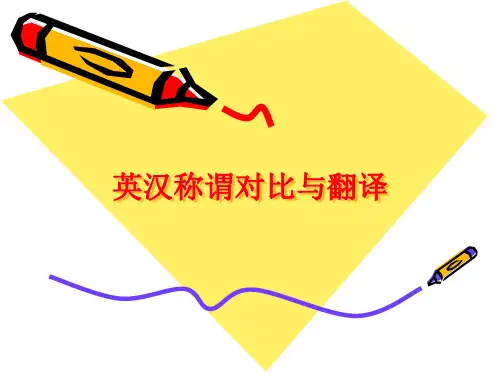
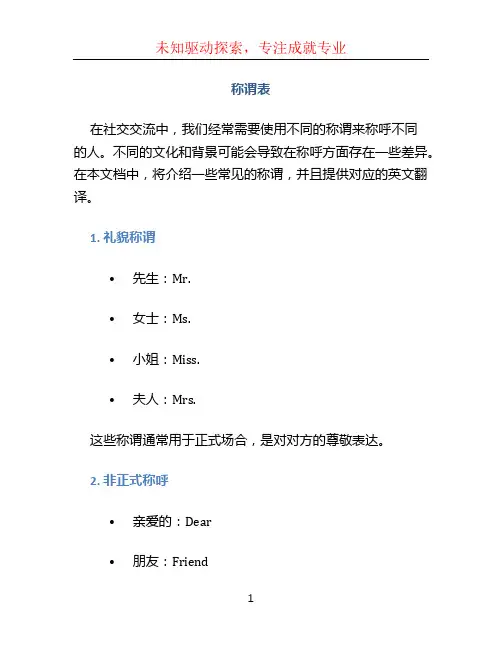
称谓表在社交交流中,我们经常需要使用不同的称谓来称呼不同的人。
不同的文化和背景可能会导致在称呼方面存在一些差异。
在本文档中,将介绍一些常见的称谓,并且提供对应的英文翻译。
1. 礼貌称谓•先生:Mr.•女士:Ms.•小姐:Miss.•夫人:Mrs.这些称谓通常用于正式场合,是对对方的尊敬表达。
2. 非正式称呼•亲爱的:Dear•朋友:Friend•哥哥:Brother•姐姐:Sister这些称呼适用于亲近的人或者非正式的场合,用于拉近人与人之间的距离。
3. 职业称谓•医生:Doctor•教师:Teacher•工程师:Engineer•律师:Lawyer这些称谓通常用于称呼不同职业的人,方便进行正式的交流和对话。
4. 家庭称谓•爸爸:Father•妈妈:Mother•儿子:Son•女儿:Daughter这些称呼用于家庭成员之间,在家庭中扮演不同的角色。
5. 敬称•阁下:Your Excellency•大人:Adult•尊敬的:Respected•尊贵的:Honorable这些敬称常见于正式场合,用于对对方的尊崇和礼貌表示。
6. 性别中立称谓•Mx.:中性称谓•Ind.:个体称谓•Per.:人称称谓这些称谓用于称呼无法确定性别的人,体现了性别中立的思想。
7. 功能称谓•团队成员:Team Member•业务合作伙伴:Business Partner•客户:Customer•领导:Leader这些称谓用于明确对对方的身份和角色,方便协作和沟通。
8. 地区称谓•先生:Mister•女士:Madam•大人:Sir/Madam•娘子军:Madam这些称谓在不同的地区和文化中可能会有所差异,适用于不同的社交场景。
以上是一些常见的称谓表,其中一些可以根据具体情境和个人偏好进行调整。
无论是日常交流还是正式场合,选择适当的称谓可以增进人与人之间的友好关系和互动。
希望本文档能够为您提供一些参考!。
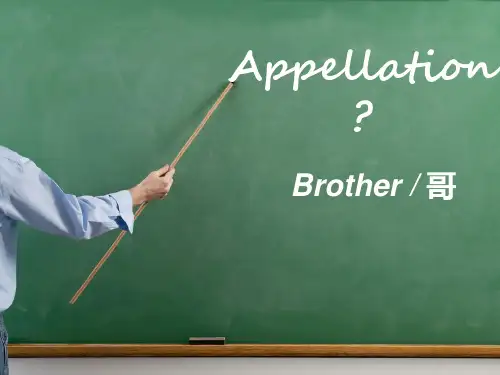
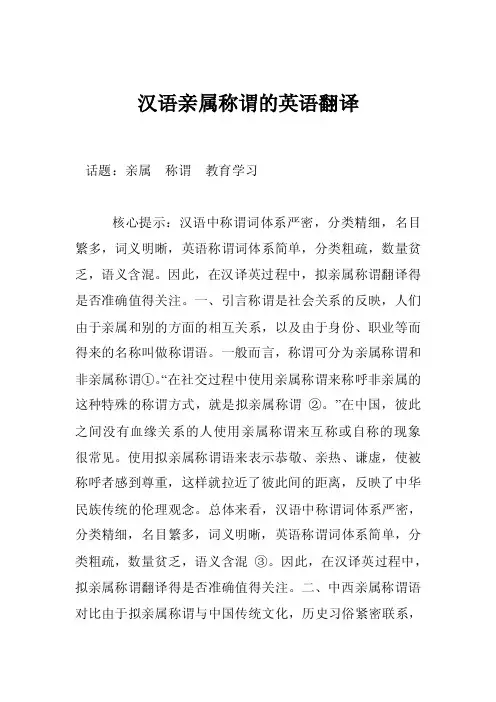
汉语亲属称谓的英语翻译话题:亲属称谓教育学习核心提示:汉语中称谓词体系严密,分类精细,名目繁多,词义明晰,英语称谓词体系简单,分类粗疏,数量贫乏,语义含混。
因此,在汉译英过程中,拟亲属称谓翻译得是否准确值得关注。
一、引言称谓是社会关系的反映,人们由于亲属和别的方面的相互关系,以及由于身份、职业等而得来的名称叫做称谓语。
一般而言,称谓可分为亲属称谓和非亲属称谓①。
“在社交过程中使用亲属称谓来称呼非亲属的这种特殊的称谓方式,就是拟亲属称谓②。
”在中国,彼此之间没有血缘关系的人使用亲属称谓来互称或自称的现象很常见。
使用拟亲属称谓语来表示恭敬、亲热、谦虚,使被称呼者感到尊重,这样就拉近了彼此间的距离,反映了中华民族传统的伦理观念。
总体来看,汉语中称谓词体系严密,分类精细,名目繁多,词义明晰,英语称谓词体系简单,分类粗疏,数量贫乏,语义含混③。
因此,在汉译英过程中,拟亲属称谓翻译得是否准确值得关注。
二、中西亲属称谓语对比由于拟亲属称谓与中国传统文化,历史习俗紧密联系,又是由亲属称谓的使用延伸而来,因此,要研究拟亲属称谓语的翻译,就需要对中西方拟亲属称谓系统做一简单的对比。
由于不同的文化背景,中西拟亲属称谓语的数量和指称的范围有很大的不同。
1 汉语拟亲属称谓表现形式汉语中的拟亲属称谓有多种表现形式,按照实际内涵来划分,可以分为有辈份限制和无辈份限制两类④:(1)有辈分限制的拟亲属称谓汉语中的拟亲属称谓多属有辈分限制的,它有多种表现形式:A 亲属称谓:爷爷、奶奶、哥(哥哥)、姐(姐姐)、叔叔、阿姨B X+亲属称谓:姓+亲属称谓:牛哥、张叔叔、王阿姨、许伯伯、张大爷老/小+姓+亲属称谓:小张叔叔、小赵阿姨、小刘哥、老李大爷老/大/小+亲属称谓:老奶奶、老伯伯、老大爷、老哥、小妹、大叔、大娘名+亲属称谓:字翔弟,庆林哥,环环姐(2)无辈分限制的拟亲属称谓无辈分限制的拟亲属称谓在汉语中不多见,表现形式有如下三种:A “大”+亲属称谓:大哥、大嫂、大姐B “小”+亲属称谓:小弟弟、小妹妹、小兄弟C 哥儿们、爷儿们2 英语亲属称谓语由于文化的差异,在英美国家,对非亲属使用亲属称谓语是不符合习俗的,即使在亲属之间,人们也习惯于使用姓名称谓。
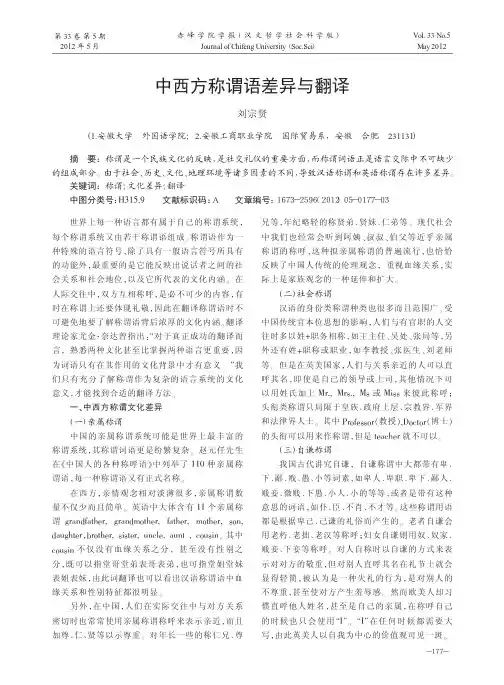
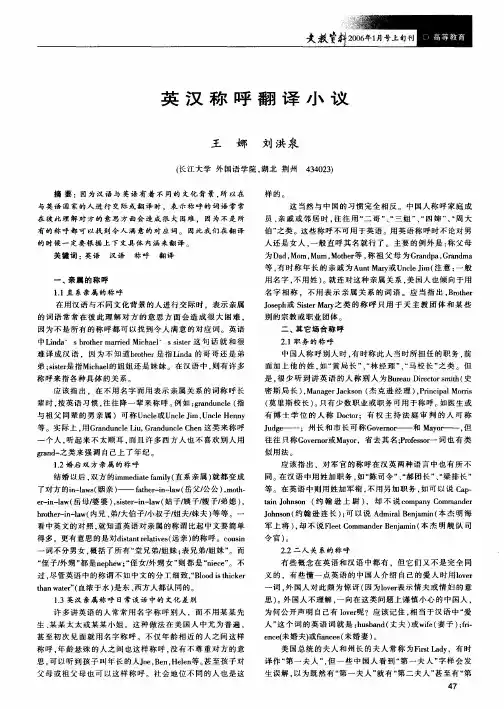
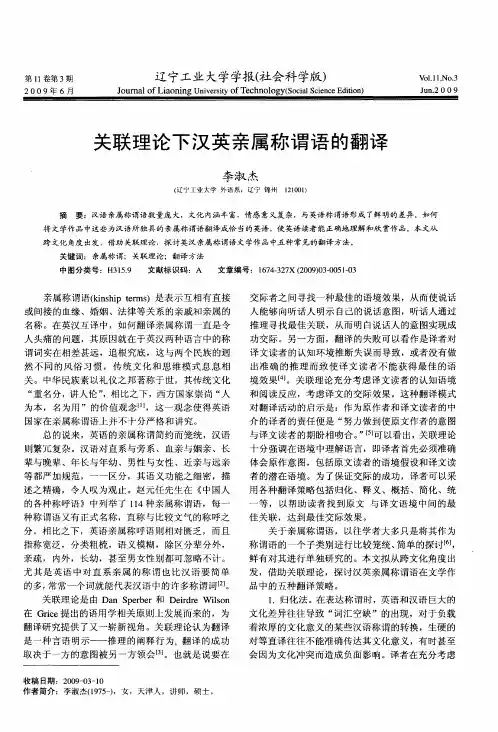
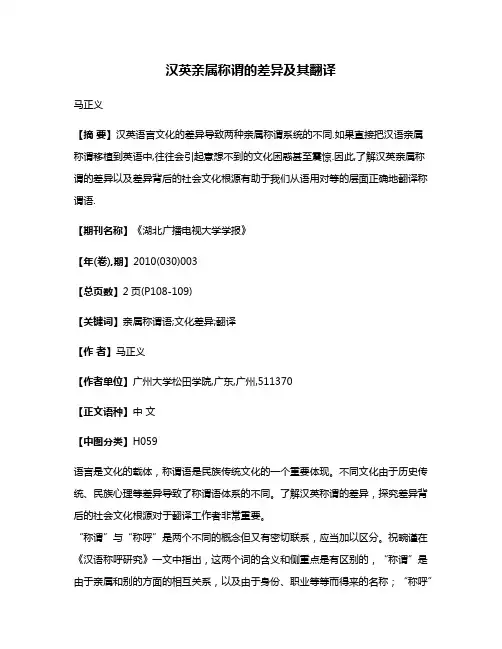
汉英亲属称谓的差异及其翻译马正义【摘要】汉英语言文化的差异导致两种亲属称谓系统的不同.如果直接把汉语亲属称谓移植到英语中,往往会引起意想不到的文化困惑甚至震惊.因此,了解汉英亲属称谓的差异以及差异背后的社会文化根源有助于我们从语用对等的层面正确地翻译称谓语.【期刊名称】《湖北广播电视大学学报》【年(卷),期】2010(030)003【总页数】2页(P108-109)【关键词】亲属称谓语;文化差异;翻译【作者】马正义【作者单位】广州大学松田学院,广东,广州,511370【正文语种】中文【中图分类】H059语言是文化的载体,称谓语是民族传统文化的一个重要体现。
不同文化由于历史传统、民族心理等差异导致了称谓语体系的不同。
了解汉英称谓的差异,探究差异背后的社会文化根源对于翻译工作者非常重要。
“称谓”与“称呼”是两个不同的概念但又有密切联系,应当加以区分。
祝畹谨在《汉语称呼研究》一文中指出,这两个词的含义和侧重点是有区别的,“称谓”是由于亲属和别的方面的相互关系,以及由于身份、职业等等而得来的名称;“称呼”是当面招呼用的表示彼此关系的名称。
称呼语更多用于当面称呼,称谓语更多用于背面指称。
一般说来,称谓可分为亲属称谓和社交称谓两大类型。
亲属称谓指的是以本人为中心确定亲族成员和本人关系的名称,是基于血亲姻亲基础上的如父亲、母亲、爷爷、伯父、姨父、姑父等等。
本文将依照梁真惠(2002)的观点,把亲属称谓再分为亲属称谓和仿亲属称谓。
以往关于称谓语以及称呼语的论著大多是从跨文化的角度进行研究,找出不同并指出差异的原因,但鲜有涉及如何对负载社会文化内涵的称谓语进行翻译。
本文拟就中英文化差异导致的亲属称谓在翻译中的困难进行尝试性探讨。
由于人类的繁衍生息是相通的,各个民族都具有表示家庭成员关系的亲属称谓系统。
总体来说,汉语称谓语要比英语称谓语繁杂细致的多。
就亲属称谓而言,汉语要区分血亲姻亲,如伯父、叔父、姨母和伯母、婶母、姨父;区分宗族非宗族,如爷爷、侄儿、孙子和外公、外甥、外孙等;区分父系母系,如叔叔、姑妈、堂兄和舅舅、姨妈、表兄等;区分长幼辈份,如哥哥、姐姐和弟弟、妹妹等,哥哥姐姐也还要分为大哥、二哥,大姐、二姐等。

英语称谓大全校长(大学)President of Beijing University 校长(中小学)Principal of Donghai Middle School院长(大学下属)Dean of the Graduate Sch ool系主任(大学学院下属)Chair/Chairman of the English Department会长\主席(学\协会)President of the Stude nt Union, Shanghai University厂长(企业)Director of the Machine Tools Manufacturing Plant院长(医院)President of Huadong Hospital 主任(中心)Director of the Business Cente r主任(行政)Director of Foreign Affairs Offi ce董事长(企业)President/Chairman of the B oard of Directors董事长(学校)President/Chairman of the B oard of Trustees首席长官的汉语称谓常以“总…….”表示,而表示首席长官的英语称谓则常带有chief,general, head, managing这类词,因此当翻译冠以“总”字的头衔时,需遵循英语头衔的表达习惯:总书记general secretary总工程师chief engineer总会计师chief accountant总建筑师chief architect总编辑chief editor; editor-in-chief; managi ng editor总出纳chief cashier; general cashier总裁判chief referee总经理general manager; managing directo r; executive head总代理general agent 总教练head coach总导演head director总干事secretary-general; commissioner总指挥commander-in-chief总领事consul-general总监chief inspector; inspector-general总厨head cook; chef有些部门或机构的首长或主管的英译,可以一些通用的头衔词表示,例如下列机构的负责人可以用director, head 或chief 来表示:司(部署)department厅(省署)department署(省属)(行署)office;administrative of fice局bureau所institute处division科section股section室office教研室program/section例:局长: director of the bureau, head of t he bureau, bureau chief.国务院the State Council 属下的部为ministry,所以部长叫做minister. 另外,公署专员叫做commissioner, 其办事机构叫做“专员公署”,英语为prefectural commissioner’s office.汉语中表示副职的头衔一般都冠以“副”字,英译时需视词语的固定搭配或表达习惯等情况,可选择vice, associate, assistant, deputy 等词。
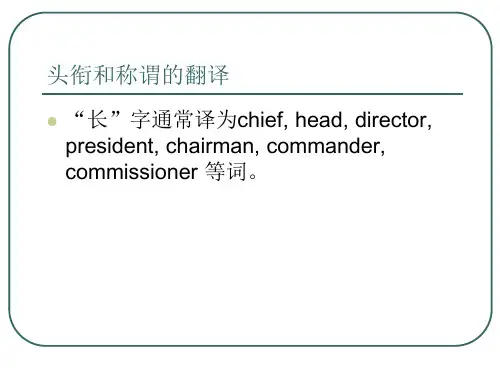
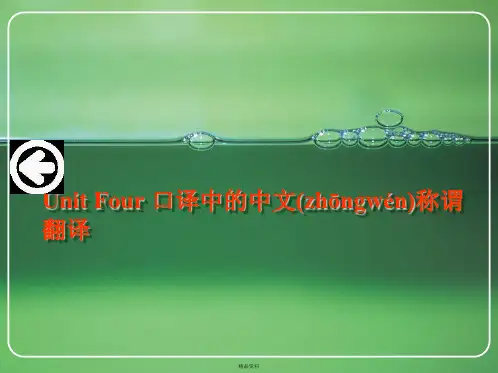
1、特定、规范的称谓:大学校长:president中小学校长:principal(principle 原则); hesdmaster中等教育(11~18岁):secondary education中等学校:secondary school中小学教育:primary and secondary education现代中等学校:secondary morden局长:director省长:governor2、首席长官的英语称谓常带有:chief、genera、head、managing:总书记:general secretary补充secretary:"I chose the tall secretary where mother sat so often writing letters by a sunny window." "secretary"在这里是一种书写的桌子,一般上面还附有一个小书架。
"Secretary"的意思还是很多的,除了常见的“秘书”之外,它还是“书记”:中共中央总书记的英文说法是"the General Secretary of the Central Committee of the Communist Party of China."省委书记是"Secretary of a provincial Party Committee. "书记处是"secretariat",它是"secretary"的变体。
秘书长"sec—retary—general", 如联合国秘书长是"the Secretary General of the United Nations."美国国务卿(the Secretary of State)财政部长(the Secretary of Treasury)教育部长(the Secretary of Education)国防部长(the Secretary of Defense)总工程师:chief engineer总编辑:editor-in-chief总经理:general manager ;managing director ;executive head3、英文中副职的表达:副主席:vice chairman/president副总理:vice premier副省长:vice governor4、行政职务的副职头衔与学术头衔的“副”职称常用:associate:副教授:associate professor(一些职位头衔:副总经理:associate/deputy manager ,associate/deputy managing director)5、其他:高级工程师:senior engineer (senior citizen =old man)首席执行官:chief executive officer(CEO)名誉校长:honorary president/principal业务经理:service/business/operation manager学习标兵:student pacemaker劳动模范:model worker优秀员工:outstanding employee ;employee of the year/month。
On the differences between Chinese and English AppellationKey words:Chinese English appellation differenceAbstract:Appellation plays a very important role in communication. For many reasons, there are many differences between Chinese and English appellation.In this essay,we will talk about these differences in terms of family appellation and social appellation briefly.Part one1.The importance of the appellationAppellation is a necessary implement in social contact,playing a role in setting up,maintaining and improving the relationship with others.Although appellation seems to be an easy problem,it is inevitable when people dealing with others. If we can't use appellations correctly especially when dealing with foreigners,it will cause some misleading or troubles.So we must pay attention to the use of appellations when communicating.What's more,when we are doing a cross-cultural communication,the use of appellation should be paid much more attention because there are many differences between different languages,for example,English and Chinese.2 Why do these differences exist?Now that there exist so many differences of appellation between English and Chinese,I begin to wander why can these differences exist?As we all know, every language has its own corresponding culture.And just is the differen structures,consanguineous relation,their different social systems, cultures traditions, hierarchy system, religions and values that determines the different patterns of appellations.Part TwoNow we can take a look at the specific differences between the two languages:English and Chinese.Because The appellation can be approximately divided into two parts:the family terms and the social terms,we will discuss in termsof this two aspects.1The difference of family appellation.When using Chinese or English to communicate with others, it will be very difficult to understand the meaning of each other's appellation,which is caused by different cultural backgrounds.In Chinese,many appellations express some specific relationship,but we can't find corresponding words in English.For example,Chinese people call their father's father"爷爷",call their mother's mother's father"姥爷",but in English,they only call"grandfather".There are still many similar examples. Then we can see Chinese family appellation is much more complicated and detailed than English.Another difference is that in Chinese,the appellation of the same generation should be distinguished according to different ages.While in English,it is very easy,without consider the difference of age.In Chinese family,there are often"大哥""二哥""大姐""二姐",and we call father's elder brother"伯伯",younger brother"叔叔",but in English,they only has"brother""sister"and "uncle".2.The difference of social appellationIn English,when people first meet,they always use "Sir"、"Madame"、"Mr. "、"Mrs."or"Dr. "and so on instead of using"comrade" or "master".And when people are getting familiar with each other ,they will call the names of them directly,such as "Peter"、"John"and so on.While in Chinese,when people first meet,they often call them "同志"、"师傅"or call them "王主任"、"张所长"、"江先生"、"赵小姐"、"吴女士"and so on.When people get familiar,they will call each other "小张"、"老李"and so on. And they call their names directly , even can call their childhood names or nick names if they are very familiar with each other.In addition,in Chinese,people even use family appellation in social communication,such as "大哥"、"大姐"、"小妹"、"大叔"、"大爷"、"大妈"、"大娘".Similarly,the social appellation of Chinese is still more complicated than that of English.Chinese people always tend to respect for seniority while English peopleemphasize personal will,freedom,individual value and the spirit of personal creativity.In English society,there are not so many complicated the sense of hierarchy which Chinese society pay much attention.Part Three1.Different self-depreciatory expressions and respectful form of addressChinese traditions makes Chinese people use self-depreciatory expressions in communicating.We always try to belittle ourselves and dignify others.When we call an elder,we always use respectful form of address,and call ourselves using self-depreciatory expressions, such as "鄙人""不才""晚生"and so on.While we can find some respectful form of address,but there aren't anyself-depreciatory expressions in English.Part FourNow we have realized the difference between English and Chinese appellation,then in order to improve our our skills in cross-cultural communication,we must know the using principle of English and Chinese appellation.1 The difference between English and Chinese appellationIn Chinese,we can use family appellations as social appellations,for example,we can call strangers(usually a man)"大伯"、"叔叔" and so on,and we can call a women"大娘"、"阿姨"、"奶奶"and so on.But once these appellations are used in English,it will be a mistake.So we should pay attention.2 Different opinions toward " 老" in English and ChineseIn Chinese,"老"means "informed"、"clever",which is a word full of honor,so older people or familiar people often can be called "老···"While in English, people hate this word very much. So we should avoid this when communicating with English.3 The difference between English and Chinese professional appellation.In Chinese,many professional words can be used as appellations,such as "王老师"、"黄工(程师)"、"吴会计",but in English,we can't use"Engineer""Teacher""Account"as appellations,we can only use "professor···"、"Doctor···"、"Captain···"and so on.4 The difference between English and Chinese nicknameBoth in English and Chinese,we can all use nick name,but the style is different.In English,there is some main fixed styles as following:(1)use the first syllable of the name.(eg.:Edward——Ed;Timothy——Tim)(2)add an "y" to the first syllable of the name.(eg.: Jennifer——Jenny,Andrew ——Andy)(3)use other parts of the name.(eg.:Anthony——tony)As far as I can see,Chinese and English has so many differences due to their different social and cultural backgrounds.So in order to improve our capability in cross-cultural communication,we must pay enough attention to the function of culture and try our best to avoid the inappropriate usage of the words and expressions,especially the appellations.References:Mao Guo'an. 2011.《A practical Course in Contrastive Studies of English and Chinese》Chongqing University PressHu Wenzhong. 1999.《A Summary of the Study of Cross-culture Communication》Foreign Language Teaching and Research PressLiu Chaoxian. 1994. 《The Difference of Appellation Between Chinese and Western and its cultural connotation》Hunan Science and Technology Press。
汉英亲属称谓语差异及翻译摘要:语言是文化的一个重要组成部分,也是文化的载体。
不同的语言有着不一样的文化背景。
汉英称呼语存在诸多差异:汉语亲属称呼语种类繁多,丰富独特,反映了汉民族长幼有序,男尊女卑的宗法伦理观念;英语亲属称呼语简洁、明了,是西方重个体、讲平、独立意识的反映。
文章通过对比汉英日常生活中称呼语的差异并从跨文化的角度分析造成差异的原因,以促进对英汉称呼语的了解和跨文化的顺利交流。
关键词:语言文化差异亲属称谓语跨文化称呼语(address forms)是人们语言中必不可少的一部分,是用来表示彼此关系的名称。
称呼语具有重要的社会功能,是称呼者对被称呼者的身份、地位、角色和相互关系的认定,骑着保持和加强各种人际关系的作用。
“亲属称呼语是称呼语体系中的重要部分,它是指以血缘关系为基础的亲属之间的相互称呼,它是以本人为轴心来确定亲属与本人关系的标志,是由历代婚姻关系中男女双方亲族的排列次序所构成的。
”不同民族的文化心理差异——汉英两种语言在表示亲属称谓关系的称谓词上呈现诸多不同,可以看出民族的文化差异在语言上的折射。
汉民族由于经历了长期宗法文化下的等级分明的封建社会,因此,汉语的亲属称呼语名目繁多,区分长辈、长有秩序、内亲外戚、南尊女卑,体现出宗法制度下影响下的上下有别,长幼有序,亲属分明的等级观念。
孟子:“国之本在家”;“圣人,人伦之至也。
”(《孟子离娄》)可看出:中国古代社会的结构核心内容是宗族制度;中国古代文化系统的基本特征是居于首要地位的伦理观念。
而西方国家只经历了短暂的封建宗法制度,由于资产阶级革命的成功,资产阶级提倡的“自由、平等、民主”的资产阶级民主深入人心,虽在历史上也曾有过外延家庭的结构模式,但进入工业社会后,这种大家庭急剧减少,取而代之的是核心家庭。
这种家庭规模小,家庭成员少,亲属关系也就日趋简单化。
因此,英语亲属称呼语只突出性别,不强调父系母系,血缘及家族关系,对因联姻而产生的亲属一律以法律认可的内涵形式出现,既简洁、命了,又体现了较强的法律意识而不含宗族或本家的亲属观念;胳臂直接爱你的称呼呈线性形式向上下伸展,不想四周扩张,是核心家庭在生活结构上的反映。
2008年11月第28卷第6期天水师范学院学报JournalofTianshuiNormalUniversityNov..2008V01.28No.6汉英称谓语的对比与翻译郭义(曲阜师范大学外国语学院,山东曲阜273165)摘要:称谓语在语言交际中起着非常重要的作用.不同语言文化的称谓语系统往往存在很大差异,在翻译中.很难实现形式对等与功能等值兼顾。
这就要求译者注重称谓语的语用功能.大胆采用译文语言中近似的称谓形式。
使译文读者能大致和源语读者一样去理解和欣赏一个文本。
对汉英语的亲属称谓语和社交称谓语进行了对比。
探讨了如何在英汉互译中实现功能等值。
关键词:称谓语;翻译;功能等值中图分类号:H315.9文献标识码:A文章编号:1671—1351(2008)06—0151-04《现代汉语词典》把称谓定义为“人们由于亲属和别方面的相互关系,以及由于身份、职业等等而得来的名称”。
称谓语可以表明交际双方的身份和人际关系以及称谓者对被称谓者的思想感情。
每种语言都有自己的称谓语系统.这些系统因各自不同的文化、历史背景及社会政治经济状况而存在较多差异。
语言交际中选择得体的称谓语.可以推动交际活动顺利进行。
一、称谓语翻译的一般原则在称谓语翻译上.译者不仅要考虑称谓语的字面意义。
更应注重其语用功能的等值。
在具体语境中,称谓语除了起指称作用外。
还往往隐含亲呢、威胁、警告、戏谑、讽刺等言外之意,或表示尊敬、提出请求、传达喜恶等话中之情。
因此,称谓语的翻译不能按其语言形式简单地直译.而必须分析其语用功能.选用目的语中恰当的称谓形式。
包惠南认为称谓语的功能等值体现在四个方面:(1)表达称谓者的情感;(2)传达称谓者的语气;(3)体现交际者的身份;(4)反映交际场合的特点。
【1J简言之.译文中选用的称谓语要和原文中的称谓语语用功能基本一致。
从读者角度来讲.“译文使读者所作出的反应与原文读者对原文所作的反应基本一致。
”121二、汉英亲属称谓语的对比与翻译汉英两种语言在亲属称谓语方面存在较大差异。